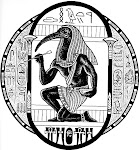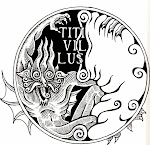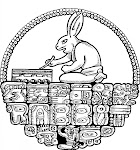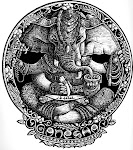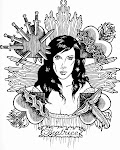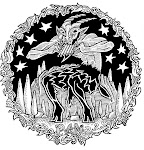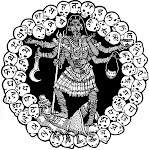
To You whom the wise exclaim
as the single-syllabled, Supreme sound,
stainless and peerless,
bliss, formless, unconditioned—
the Indweller in the core of
sacred tradition—to that
Primeval One I bow in adoration.
— Shri Adi Sankara, Ganesha Bhujangam
When I began my record of the Writer’s Pantheon, maybe I should have started with Ganesha, lord of beginnings. Maybe then I would know how to begin to write of your greatness—Ganesha, Ganapati, Vigneshvara, Pillaiyar—majestic god of writers and scribes, infinite source of wisdom and learning, supreme patron of artists, divine remover of obstacles. How do I begin to write of you now? Do I begin with your birth, as Dickens did in the archetypal opening lines of David Copperfield (1850)?
Whether I shall turn out to be the hero of my own life, or whether that station will be held by anybody else, these pages must show. To begin my life with the beginning of my life, I record that I was born ...
If I start with an account of your birth, surely my words will be insufficient to depict the way in which Parvati, your divine mother, lovingly fashioned you from her bath oils and commanded you to stand guard while she bathed. In your first moments, in your filial devotion to your mother, how were you to know the face of your father? When Shiva returned and demanded entrance you faithfully barred his way, and paid for that duty with your head. Parvati, enraged, demanded that your head be restored. The first creature at hand was an elephant, and with its head joined to your body you assumed your vast comprehension, your splendour and grandeur.
But what of your many other beginnings, the eminent variations and alternative versions of your nativity? And surely there is no doubt that you are the hero of your own life, Oh Ganesha. Perhaps I should overturn convention, and begin with the assured, iconoclastic voice of Holden Caulfield in the opening lines of The Catcher in the Rye (1951):
If you really want to hear about it, the first thing you'll probably want to know is where I was born, and what my lousy childhood was like, and how my parents were occupied and all before they had me, and all that David Copperfield kind of crap, but I don't feel like going into it, if you want to know the truth.
No, not reverent enough. Perhaps I should simply begin in medias res, that ancient literary technique of beginning a tale in the midst of the action, epitomized in the opening lines of Dante’s Divine Comedy (1308-1321): “Midway upon the journey of our life / I found myself within a forest dark, / For the straightforward pathway had been lost.” This is the technique you sanctioned in the Mahabharata, the epic text for which you agreed to act as scribe, in that magnanimous agreement with Vyasa when, some say, you broke off your own tusk to employ it as a pen, the emblem of your support for all writers as they embark on their difficult work:
Then Vyasa began to call to mind Ganesa. And Ganesa, obviator of obstacles, ready to fulfil the desires of his votaries, was no sooner thought of, than he repaired to the place where Vyasa was seated. ... Ganesa having signified his assent, by repeating the word Om! proceeded to write; and Vyasa began; and by way of diversion, he knit the knots of composition exceeding close; by doing which, he dictated this work according to his engagement.
If I begin in the midst of your story, Ganesha, perhaps I could write of your contemporary veneration. As one of the most sacred figures in Hindu religious practice, your relevance and vitality are reflected everywhere in your popular iconography. Your image adorns school text books, currency, jewellery, sculpture, t-shirts, tattoos, corporate boardrooms—anything and anywhere that may benefit from your wisdom, creativity, and grace. The annual Ganesha Chaturthi is your most elaborate and beautiful celebration, a 10-day festival in the Hindu calendar dedicated to your worship, culminating in processions to the sea, to waterfalls, to pools and other bodies of water, where brilliant statues of you are immersed, a symbol of cleansing, rebirth, a new beginning.
Ganesha, I don’t know how to begin to praise you. In the absence of a beginning, I will end with borrowed words, words you have inspired, words to inspire infinite beginnings:
O Lord and ruler of many ganas, O Peaceful One who loves pomp and ceremony, patron of the arts and preserver of the best of ancient cultures, the one worshiped by all sages, use Your mighty trunk to hold us close to Your majestic mind, our purest state. Respond to our entreaties for clarity and direction, for this we supplicate. Protect us from beguiling ways and sternly direct us in the ways of our forefathers' traditions, forging for us new patterns to bring forth the old in the world of today. Keep us resolute to live the Sanatana Dharma. We prostrate at Your holy feet. Please grant us Your grace. Ganesha sharanam, sharanam Ganesha.
Sources
J. A. Coleman. The Dictionary of Mythology: An A-Z of Themes, Legends and Heroes. London: Arcturus Publishing Limited, 2008.
Arthur Cotterell. A Dictionary of World Mythology. Oxford: Oxford University Press, 1986.
David Copperfield by Charles Dickens. Project Gutenberg. (accessed 1 February 2009)
http://www.gutenberg.org/etext/766
Discovering Ganesh (accessed 1 February 2009)
http://www.discoveringganesh.com/
The Divine Comedy. Electronic Literature Foundation. (Longfellow translation, 1867) (accessed 1 February 2009)
http://www.divinecomedy.org/
“Ganesh Chaturthi” Wikipedia (accessed 1 February 2009)
http://en.wikipedia.org/wiki/Ganesh_Chaturthi
“Ganesha” Wikipedia (accessed 1 February 2009)
http://en.wikipedia.org/wiki/Ganesha
“Ganesha Images Popular Worldwide” Devi Mandir (accessed 31 January 2009)
http://www.devimandir.com/index.php?Itemid=81&id=96&option=com_content&task=view
Hindu Temple of Ottawa-Carleton (accessed 1 February 2009)
http://www.hindutemple.ca/
Loving Ganesha, Prayers to Lord Ganesha (accessed 1 February 2009)
http://www.himalayanacademy.com/resources/books/lg/lg_ch-11.html
Mahābhārata (accessed 1 February 2009)
http://en.wikipedia.org/wiki/Mah%C4%81bh%C4%81rata
The Mahabharata. Internet Sacred Text Archive (accessed 1 February 2009)
http://www.sacred-texts.com/hin/m01/m01002.htm
“Origins of Ganesha Worship” sreenivasarao s (accessed 1 February 2009)
http://ssubbanna.sulekha.com/blog/post/2008/09/origins-of-ganesha-worship.htm
J. D. Salinger. The Catcher in the Rye. New York: Little, Brown and Company, 1991.
— Shri Adi Sankara, Ganesha Bhujangam
When I began my record of the Writer’s Pantheon, maybe I should have started with Ganesha, lord of beginnings. Maybe then I would know how to begin to write of your greatness—Ganesha, Ganapati, Vigneshvara, Pillaiyar—majestic god of writers and scribes, infinite source of wisdom and learning, supreme patron of artists, divine remover of obstacles. How do I begin to write of you now? Do I begin with your birth, as Dickens did in the archetypal opening lines of David Copperfield (1850)?
Whether I shall turn out to be the hero of my own life, or whether that station will be held by anybody else, these pages must show. To begin my life with the beginning of my life, I record that I was born ...
If I start with an account of your birth, surely my words will be insufficient to depict the way in which Parvati, your divine mother, lovingly fashioned you from her bath oils and commanded you to stand guard while she bathed. In your first moments, in your filial devotion to your mother, how were you to know the face of your father? When Shiva returned and demanded entrance you faithfully barred his way, and paid for that duty with your head. Parvati, enraged, demanded that your head be restored. The first creature at hand was an elephant, and with its head joined to your body you assumed your vast comprehension, your splendour and grandeur.
But what of your many other beginnings, the eminent variations and alternative versions of your nativity? And surely there is no doubt that you are the hero of your own life, Oh Ganesha. Perhaps I should overturn convention, and begin with the assured, iconoclastic voice of Holden Caulfield in the opening lines of The Catcher in the Rye (1951):
If you really want to hear about it, the first thing you'll probably want to know is where I was born, and what my lousy childhood was like, and how my parents were occupied and all before they had me, and all that David Copperfield kind of crap, but I don't feel like going into it, if you want to know the truth.
No, not reverent enough. Perhaps I should simply begin in medias res, that ancient literary technique of beginning a tale in the midst of the action, epitomized in the opening lines of Dante’s Divine Comedy (1308-1321): “Midway upon the journey of our life / I found myself within a forest dark, / For the straightforward pathway had been lost.” This is the technique you sanctioned in the Mahabharata, the epic text for which you agreed to act as scribe, in that magnanimous agreement with Vyasa when, some say, you broke off your own tusk to employ it as a pen, the emblem of your support for all writers as they embark on their difficult work:
Then Vyasa began to call to mind Ganesa. And Ganesa, obviator of obstacles, ready to fulfil the desires of his votaries, was no sooner thought of, than he repaired to the place where Vyasa was seated. ... Ganesa having signified his assent, by repeating the word Om! proceeded to write; and Vyasa began; and by way of diversion, he knit the knots of composition exceeding close; by doing which, he dictated this work according to his engagement.
If I begin in the midst of your story, Ganesha, perhaps I could write of your contemporary veneration. As one of the most sacred figures in Hindu religious practice, your relevance and vitality are reflected everywhere in your popular iconography. Your image adorns school text books, currency, jewellery, sculpture, t-shirts, tattoos, corporate boardrooms—anything and anywhere that may benefit from your wisdom, creativity, and grace. The annual Ganesha Chaturthi is your most elaborate and beautiful celebration, a 10-day festival in the Hindu calendar dedicated to your worship, culminating in processions to the sea, to waterfalls, to pools and other bodies of water, where brilliant statues of you are immersed, a symbol of cleansing, rebirth, a new beginning.
Ganesha, I don’t know how to begin to praise you. In the absence of a beginning, I will end with borrowed words, words you have inspired, words to inspire infinite beginnings:
O Lord and ruler of many ganas, O Peaceful One who loves pomp and ceremony, patron of the arts and preserver of the best of ancient cultures, the one worshiped by all sages, use Your mighty trunk to hold us close to Your majestic mind, our purest state. Respond to our entreaties for clarity and direction, for this we supplicate. Protect us from beguiling ways and sternly direct us in the ways of our forefathers' traditions, forging for us new patterns to bring forth the old in the world of today. Keep us resolute to live the Sanatana Dharma. We prostrate at Your holy feet. Please grant us Your grace. Ganesha sharanam, sharanam Ganesha.
Sources
J. A. Coleman. The Dictionary of Mythology: An A-Z of Themes, Legends and Heroes. London: Arcturus Publishing Limited, 2008.
Arthur Cotterell. A Dictionary of World Mythology. Oxford: Oxford University Press, 1986.
David Copperfield by Charles Dickens. Project Gutenberg. (accessed 1 February 2009)
http://www.gutenberg.org/etext/766
Discovering Ganesh (accessed 1 February 2009)
http://www.discoveringganesh.com/
The Divine Comedy. Electronic Literature Foundation. (Longfellow translation, 1867) (accessed 1 February 2009)
http://www.divinecomedy.org/
“Ganesh Chaturthi” Wikipedia (accessed 1 February 2009)
http://en.wikipedia.org/wiki/Ganesh_Chaturthi
“Ganesha” Wikipedia (accessed 1 February 2009)
http://en.wikipedia.org/wiki/Ganesha
“Ganesha Images Popular Worldwide” Devi Mandir (accessed 31 January 2009)
http://www.devimandir.com/index.php?Itemid=81&id=96&option=com_content&task=view
Hindu Temple of Ottawa-Carleton (accessed 1 February 2009)
http://www.hindutemple.ca/
Loving Ganesha, Prayers to Lord Ganesha (accessed 1 February 2009)
http://www.himalayanacademy.com/resources/books/lg/lg_ch-11.html
Mahābhārata (accessed 1 February 2009)
http://en.wikipedia.org/wiki/Mah%C4%81bh%C4%81rata
The Mahabharata. Internet Sacred Text Archive (accessed 1 February 2009)
http://www.sacred-texts.com/hin/m01/m01002.htm
“Origins of Ganesha Worship” sreenivasarao s (accessed 1 February 2009)
http://ssubbanna.sulekha.com/blog/post/2008/09/origins-of-ganesha-worship.htm
J. D. Salinger. The Catcher in the Rye. New York: Little, Brown and Company, 1991.
